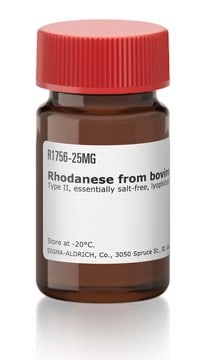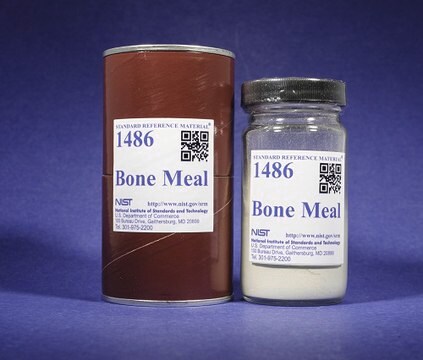NIST1577C
Bovine liver
NIST® SRM® 1577c
Se connecterpour consulter vos tarifs contractuels et ceux de votre entreprise/organisme
About This Item
Code UNSPSC :
41116107
Nomenclature NACRES :
NA.24
Produits recommandés
Qualité
certified reference material
Niveau de qualité
Forme
solid
Conditionnement
pkg of 20 g
Fabricant/nom de marque
NIST®
Technique(s)
mass spectrometry (MS): suitable
Format
matrix material
Température de stockage
10-30°C
Description générale
This bovine liver standard reference material (SRM) consists of liver tissues from healthy steers. The tissue is collected and prepared under strict protocols designed to preserve the original composition and minimize contamination. A unit of NIST1577C consists of one bottle containing 20 g of freeze-dried liver powder.
NIST1577C_Cert
NIST1577C_SDS
NIST1577C_Cert
NIST1577C_SDS
Application
The bovine liver standard reference material (SRM) is intended for use in evaluating the accuracy of analytical methods for 25-hydroxyvitamin D3 in animal tissues and other biological materials.
Autres remarques
- Details on expiry, storage, usage, and sample preparation and analysis are available in the NIST certificate.
- Information on disposal and transportation is documented in SDS.
Certified for the analytes listed below. See certificate for values and more details
Nitrogen, Phosphorous
Trace Elements: Antimony (SB), Arsenic (As), Cadmium (Cd), Calcium (Ca), Cesium (Cs), Chlorine (Cl2), Chromium (Cr), Cobalt (Co), Copper (Cu), Gold (Au), Hydrogen (H), Iron (Fe), Lead (Pb), Lithium (Li), Magnesium (Mg), Manganese (Mn), Mercury (Hg), Molybdenum (Mo), Nickel (Ni), Potassium (K), Rubidium (Rb), Selenium (Se), Silicium (Si), Sodium (Na), Strontium (Sr), Sulfur (S), Vanadium (V), Zinc (Zn)
Matrix Group: Meat
Nitrogen, Phosphorous
Trace Elements: Antimony (SB), Arsenic (As), Cadmium (Cd), Calcium (Ca), Cesium (Cs), Chlorine (Cl2), Chromium (Cr), Cobalt (Co), Copper (Cu), Gold (Au), Hydrogen (H), Iron (Fe), Lead (Pb), Lithium (Li), Magnesium (Mg), Manganese (Mn), Mercury (Hg), Molybdenum (Mo), Nickel (Ni), Potassium (K), Rubidium (Rb), Selenium (Se), Silicium (Si), Sodium (Na), Strontium (Sr), Sulfur (S), Vanadium (V), Zinc (Zn)
Matrix Group: Meat
Informations légales
NIST is a registered trademark of National Institute of Standards and Technology
SRM is a registered trademark of National Institute of Standards and Technology
Produit(s) apparenté(s)
Réf. du produit
Description
Tarif
Code de la classe de stockage
11 - Combustible Solids
Classe de danger pour l'eau (WGK)
WGK 3
Faites votre choix parmi les versions les plus récentes :
Certificats d'analyse (COA)
Lot/Batch Number
Désolés, nous n'avons pas de COA pour ce produit disponible en ligne pour le moment.
Si vous avez besoin d'assistance, veuillez contacter Service Clients
Déjà en possession de ce produit ?
Retrouvez la documentation relative aux produits que vous avez récemment achetés dans la Bibliothèque de documents.
Les clients ont également consulté
Michał Majewski et al.
Pharmacological reports : PR, 71(5), 862-869 (2019-08-14)
Experimental studies have emphasized that cardiovascular alterations can be improved by the long-term use of resveratrol (trans-3,5,4'-trihydroxystilbene; RSV) as well as dietary copper (Cu) intake. Male Wistar rats were supplemented for 8 weeks with Cu (6.5 mg/kg diet) as either nanoparticles
Validation of a microwave-assisted digestion procedure of pate samples using diluted HNO3 for Fe and Zn
determination by FS FAAS
Silveria N. P. S, et al.
Analytical Methods : Advancing Methods and Applications, 5, 6411-6411 (2013)
Michał Majewski et al.
Toxicology and applied pharmacology, 390, 114877-114877 (2020-01-10)
Copper (Cu) deficiency plays an important role in the development of cardiovascular disorders. Resveratrol (RSV) possesses pleiotropic cardiovascular benefits; however, the mechanism(s) by which RSV exerts protective effects are not completely understood. Male Wistar rats at 6 weeks of age were
Jianzong Zhou et al.
Journal of agricultural and food chemistry, 70(15), 4765-4773 (2022-04-07)
Quantification of trace and minor nutrient elements is crucial for maintaining human health. A reliable laser ablation inductively coupled plasma mass spectrometry (LA-ICP-MS) method for food materials was developed by combining fine food powder (dm < 3 μm) pellets as
Notre équipe de scientifiques dispose d'une expérience dans tous les secteurs de la recherche, notamment en sciences de la vie, science des matériaux, synthèse chimique, chromatographie, analyse et dans de nombreux autres domaines..
Contacter notre Service technique









